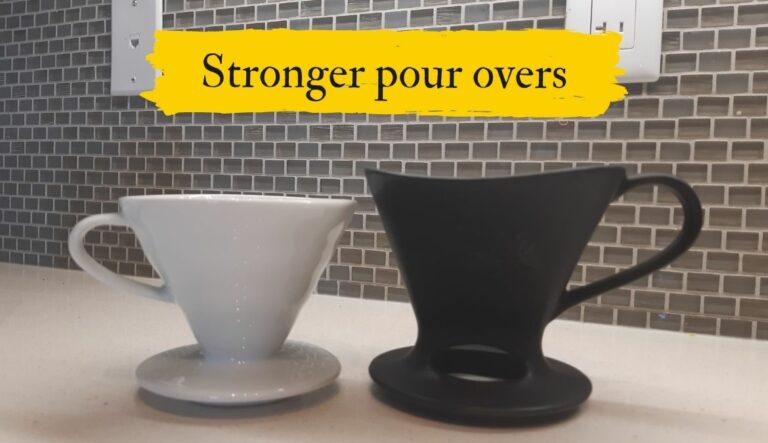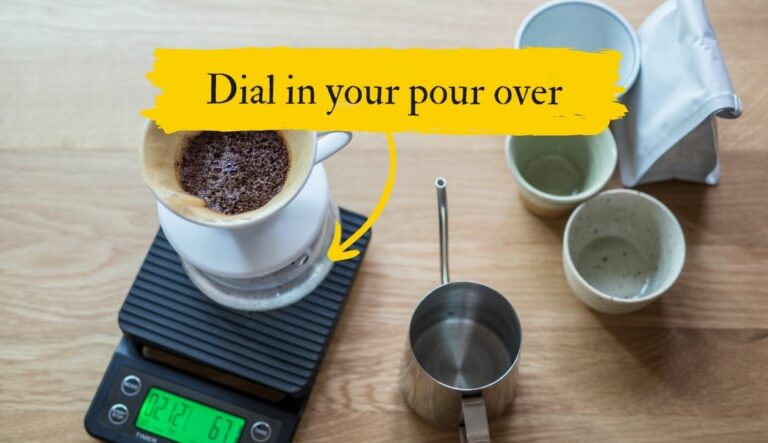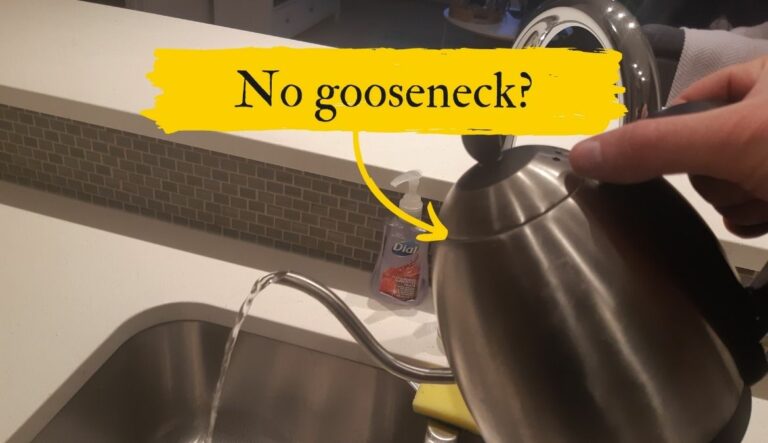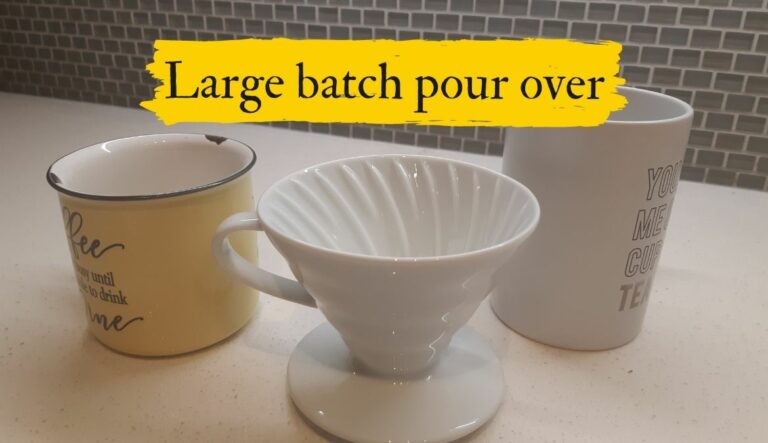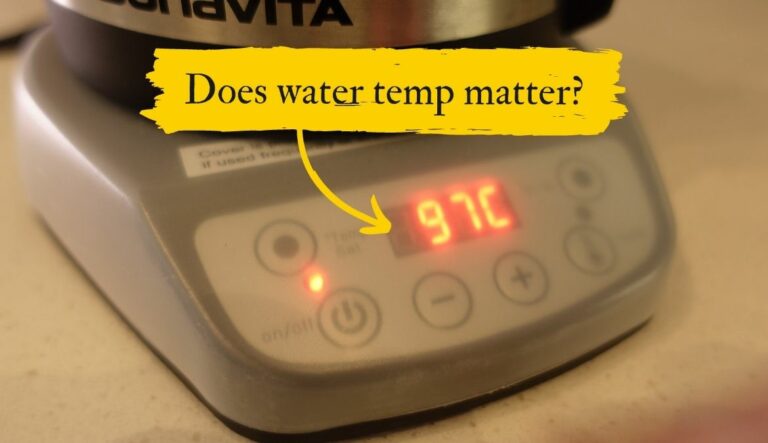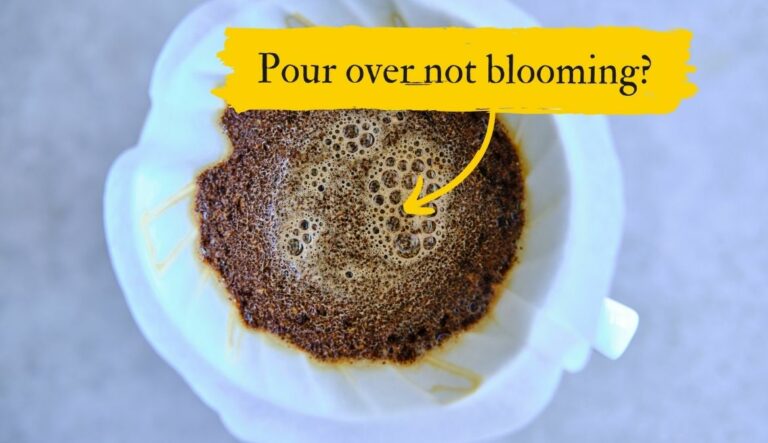Most specialty coffee enthusiasts understand the importance of things like brew temperature, coffee-to-water ratio and grind size for brewing a tasty cup of pour over coffee. But many coffee lovers overlook the importance of water quality.
So, why is water quality important and what is the best water to use for pour over coffee?
Pour over coffee has more robust flavors when it is made using moderately hard water with a TDS between 100-300ppm. More specifically, the best coffee water contains a moderately high concentration of magnesium and a low concentration of carbonates.
There are many water quality factors that affect coffee making and many water sources to consider. Here’s how to improve your next pour over coffee with better water quality.
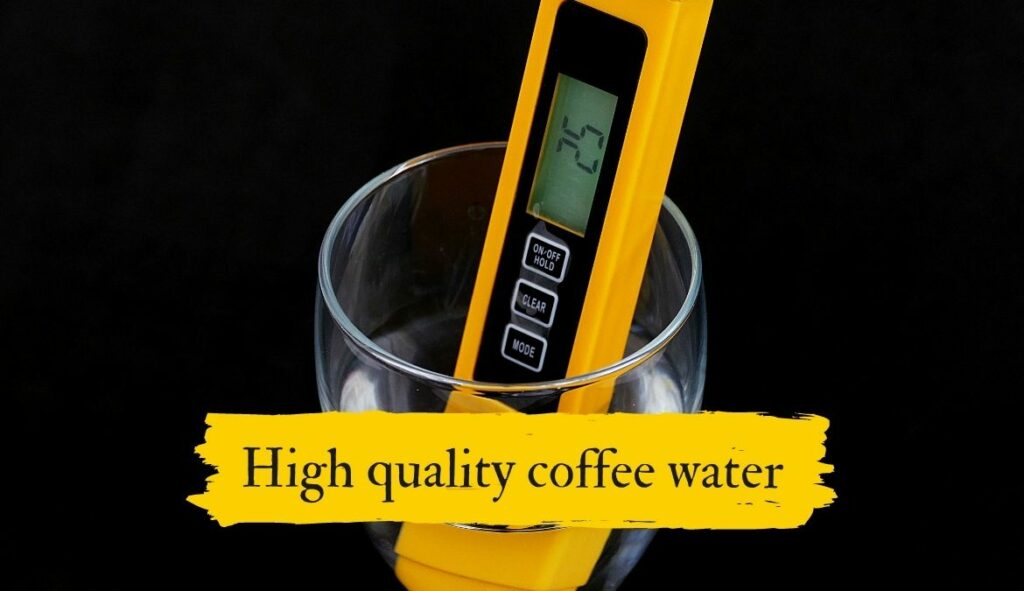
Why does water quality matter for coffee making?
Studies have shown that water composition dramatically affects how sugar, starches, bases and acids are extracted from coffee beans[2]. Water containing a high concentration of dissolved minerals will cause coffee to taste weak and lackluster.
This is especially important for specialty coffee lovers who are seeking some of the more subtle and nuanced flavors that come from a lighter roast.
What is water hardness?
Water hardness refers to the concentration of dissolved minerals in a body of water, such as calcium, magnesium, nitrate and carbonates. There are different water hardness metrics that measure different types of dissolved minerals.
How do you measure coffee water hardness?
You can test your tap water’s hardness by using a TDS meter, pH meter, test strips or liquid drop test kits. Some of these tests will measure the total hardness or TDS of your water, while others may be separated into more specific tests for GH, KH and pH.
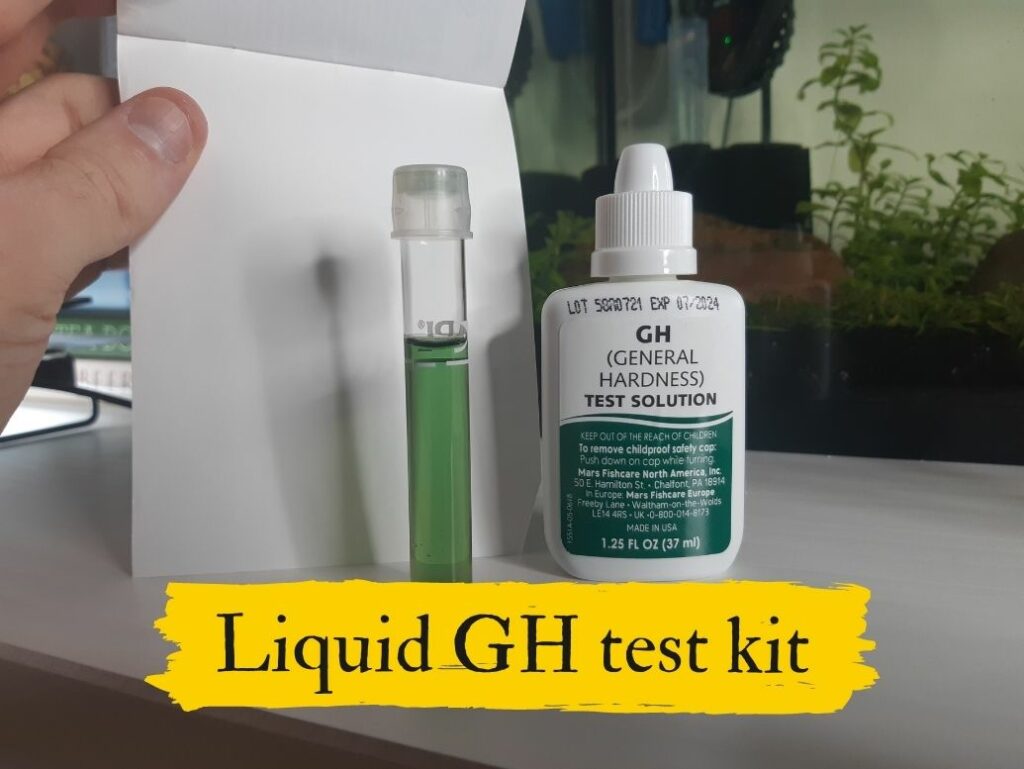
What water tests should you do for coffee making?
A TDS meter is the simplest water quality test that will help you improve the quality of your coffee. These devices measure the concentration of most, or all, dissolved solids in your source water.
You can buy an inexpensive TDS meter online for between $20-$50. These may not produce results as consistent as more expensive TDS lab equipment, but it’s certainly adequate for coffee making purposes.
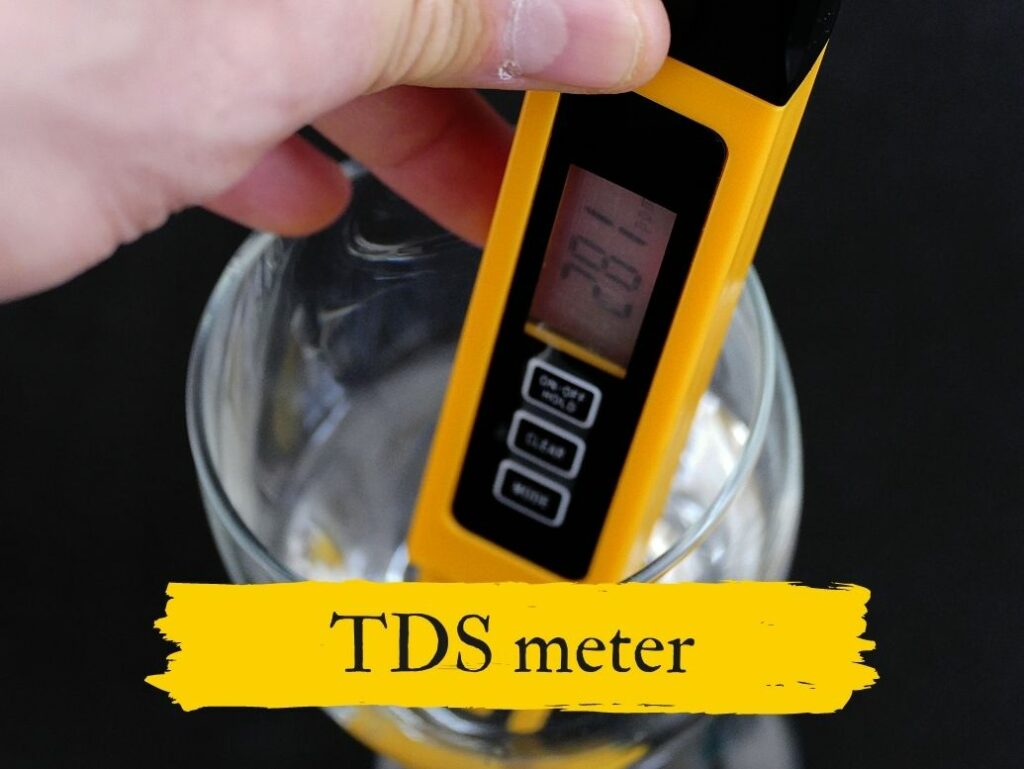
You can also buy test strips or liquid test kits to measure carbonate hardness (KH) and general hardness (GH). The KH test measures the concentrations of carbonate and bicarbonates, which buffer against pH but are shown to make coffee less tasty.
The GH test measures calcium and magnesium concentrations. Magnesium is shown to increase extraction and improve coffee taste.
Both GH and KH represent a few of the many total dissolved solids that may exist in your water. So it’s best to use these tests in combination with a TDS meter to get a more complete picture of your water quality.
Why does hard water make better coffee?
Slightly hard water tends to produce better tasting coffee because magnesium ions have been proven to extract more flavor from coffee beans. However, hard water often includes other dissolved minerals that have the opposite effect.
Total dissolved solids (TDS)
One method is to measure the total dissolved solids (TDS) in water. This measurement simply measures the concentration, in parts-per-million (ppm), of all dissolved material in water.
This includes calcium, magnesium, sulfate, nitrate, carbonates and many others. Each of these dissolved solids can be found in varying concentrations depending on where the water is sourced from.
They each also affect the taste of coffee in different ways.
The Specialty Coffee Association of Europe (SCAE) suggests that 300ppm is the maximum TDS to achieve an optimal coffee extraction. You should aim to reduce your TDS below 300ppm.
General hardness (GH) and carbonate hardness (KH)
Two commonly referenced water hardness metrics are general hardness (GH) and carbonate hardness (KH). KH measures the concentration of carbonates and bicarbonates in the water. GH measures the concentration of dissolved calcium and magnesium ions.
Studies have shown that coffee is described as flat or lacking flavor when it is made with water containing carbonates[3]. Carbonates are usually found in higher concentrations where water is sourced from rivers rather than lakes.
Another peer-reviewed study from the Journal of Agricultural and Food Chemistry found that magnesium-rich water is ideal for coffee making because it increases how much extraction will occur[1].
Water hardness changes by geography
Your local tap water will have varying levels of magnesium, carbonates and other dissolved solids. For example, Calgary tap water has a KH of about 125ppm, a GH of about 250ppm and a pH of about 8.2. Whereas cities in the southeast USA have water hardness between 50-60ppm.
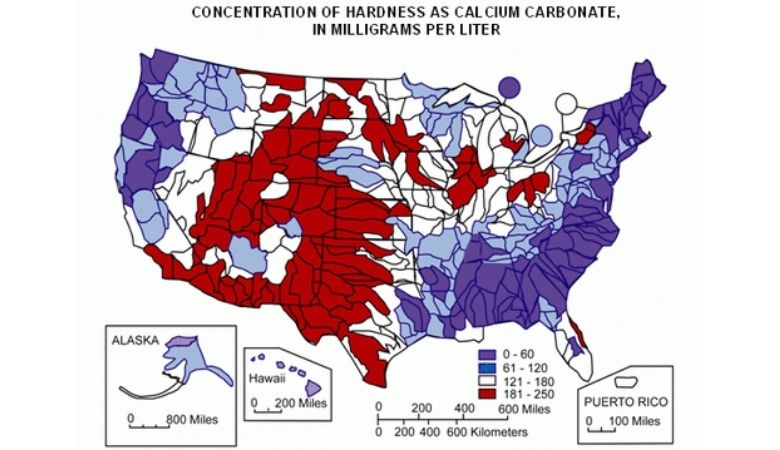
Each of these regions will produce coffee that tastes different because they have considerably different water hardness levels that will alter the rate of extraction.
As a result, it may be worth measuring the TDS and hardness values of your tap water and consider making adjustments to achieve an optimal range for coffee making best practices.
What is the best water to use for pour over coffee?
The best pour over water contains less than 300ppm of total dissolved solids (TDS), a high concentration of magnesium (general hardness) and a low concentration of carbonates (carbonate hardness). This maximizes coffee extraction while minimizing unpleasant flavors.
Is distilled water good for pour over coffee?
Distilled water is not ideal for pour over coffee because it has a near 0.0 TDS and contains few or no magnesium ions or other dissolved solids. This negatively affects the extraction of coffee, resulting in a less flavorful beverage.
Is reverse osmosis tap water good for pour over coffee?
Similar to distilled water, reverse osmosis (RO) water contains little to no dissolved solids. Most RO systems tend to filter water down to a TDS of 25ppm or less.
Although a high concentration of solids and minerals is shown to produce a poor-tasting coffee, it has been proven that some dissolved solids are important for brewing good coffee.
Experts recommend a TDS of less than 300ppm.
Is bottled water good for pour over coffee?
Artesian water is a great choice for pour over coffee because it contains a moderate concentration of total dissolved solids (TDS). Enough to promote successful coffee extraction but usually not so much to impart an unpleasant taste on the beverage.
Thi varies by brand and where they source their artesian water from. Examples of artesian water include Fiji, Nakd, eVamor, Eternal and Jana.
Distilled water bottles are not great on their own for pour over coffee because they contain little to no TDS. They are useful for mixing with hard tap water that might have a TDS above 300ppm.
Mineral bottled water usually contains too many dissolved solids for an optimal pour over brew. It can still certainly be used but it may impart an unpleasant taste to the coffee that might mask the more pleasant flavors in the beans.
References
- Hendon, C. H., Colonna-Dashwood, L., & Colonna-Dashwood, M. (2014). The role of dissolved cations in coffee extraction. Journal of agricultural and food chemistry, 62(21), 4947-4950.
- Navarini, L., & Rivetti, D. (2010). Water quality for Espresso coffee. Food chemistry, 122(2), 424-428.
- Pangborn, R. M., TRABUE, I. M., & LITTLE, A. C. (1971). Analysis of coffee, tea and artificially flavored drinks prepared from mineralized waters. Journal of Food Science, 36(2), 355-362.

